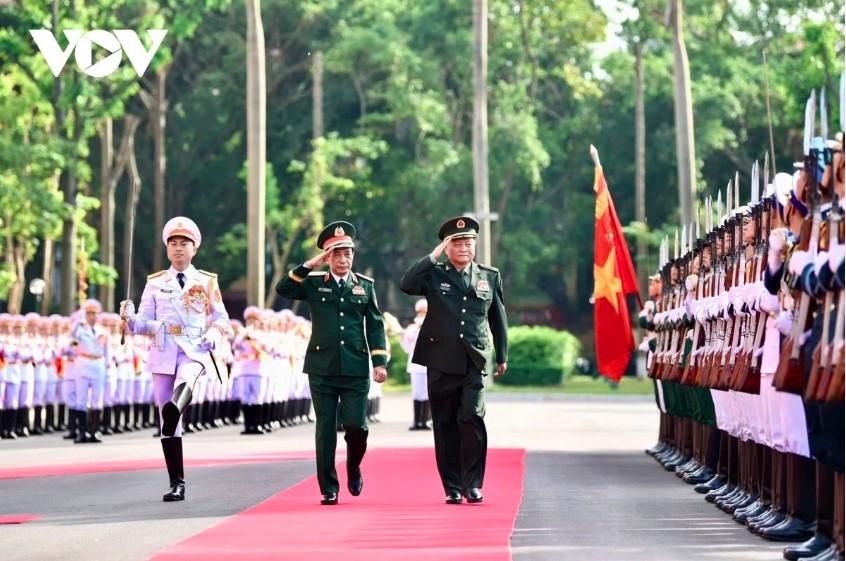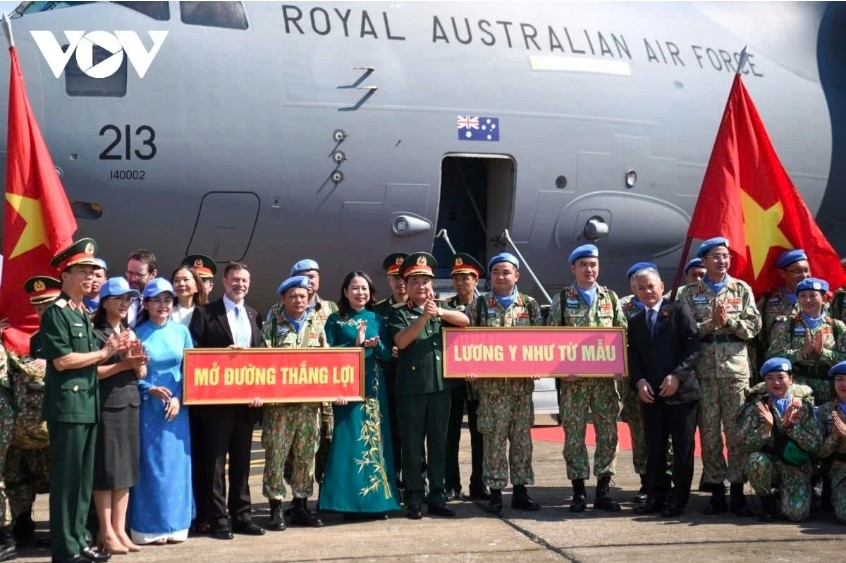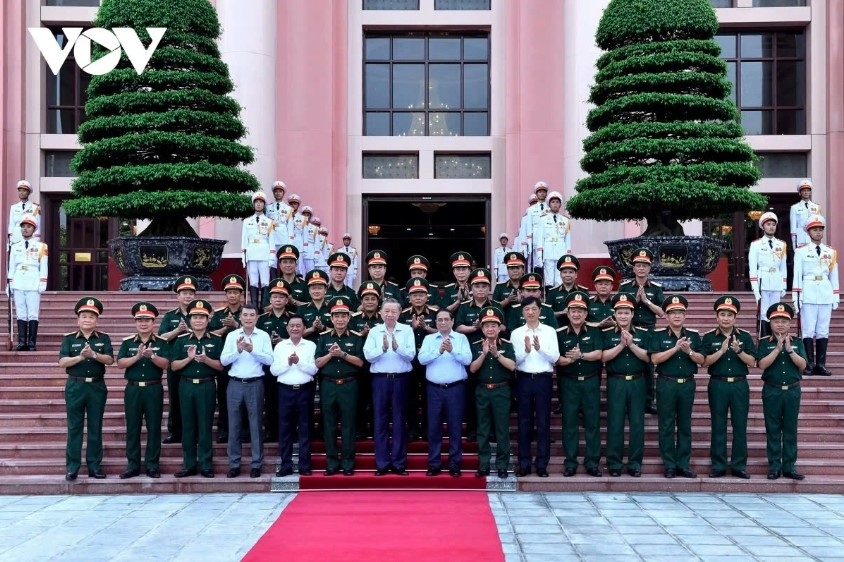Defence diplomacy contributes to protecting the Fatherland early and from afar
VOV.VN - Implementing the foreign policy of the Party and State, realizing the goals, viewpoints, and directions of the Central Military Commission and the Ministry of National Defence, recent years has seen international integration and defence diplomacy carried out synchronously and proactively, achieving comprehensive results, and continuing to be one of the important pillars of Party diplomacy, State diplomacy, and citizen diplomacy.

International integration and defence diplomacy contribute to protecting the Fatherland both early and from afar; building strategic trust; enhancing the nation’s international position and prestige; leveraging defence strength; and maintaining a peaceful, stable, co-operative, and friendly environment for national development.
International integration and defence diplomacy have truly become key pillars in terms of the national defence strategy and are one of the important contributory factors to the implementation of an independent, self-reliant, diversified, and multilateral foreign policy aimed at meeting relevant national defence goals. This is also viewed as an important and regular task of the army during peacetime.
Assessing the role of the Vietnamese defence diplomacy over the recent past, Vietnamese Minister of National Defence General Phan Van Giang emphasized, "During his lifetime, President Ho Chi Minh, the founder of Vietnam's foreign affairs, taught that strength is the gong, and diplomacy is the sound. The bigger the gong, the louder the sound. And we must be constant and adapt to all changes. Following Uncle Ho's teachings, defence diplomacy has always played a good role as an important part of the Party's foreign affairs, state diplomacy and citizen diplomacy."
With the comprehensive, flexible, and effective implementation at both bilateral and multilateral levels, defence diplomacy in recent times has contributed to building trust, maintaining friendly relations with other countries, creating and keeping a peaceful environment for national development, while also solidifying defence potential.
Many bilateral defence relations have been consolidated, deepened, and stabilised, especially ties with neighbouring countries, major countries, ASEAN member states, and traditional friends.
Vietnam has so far set up defence relations with more than 100 countries, most of which are key partners; established 33 permanent defence attaché offices in other countries and at the UN headquarters; whilst 52 countries have established defence attaché offices and military attaché offices in Vietnam.
The country has promoted defence diplomacy in all forms such as exchanging military delegations at all levels; holding defence consultations and dialogues; and participating in regional and international forums in order to foster friendship and mutual understanding, trust building, and conflict prevention.
Through defence diplomacy, international friends better understand the history of the Vietnamese nation, the peaceful and self-defence nature of Vietnam, and the tradition and good nature of the heroic Vietnam People's Army.

Minister of Foreign Affairs Bui Thanh Son affirmed, “Defence diplomacy has performed well its foreign affairs and defence tasks. Firstly, it has made an important contribution to strengthening political trust, intertwining interests, especially with neighboring countries and important partners, contributing to protecting the Fatherland from afar and maintaining a peaceful and stable environment for national development.
Second, besides contributing to enhancing the international prestige of the country and army, defence diplomacy also mobilizes external resources to strengthen defence potential, contributing to fully tapping the potential and overall strength of the nation.”
In recent times, Vietnam has been recognized and highly appreciated by ASEAN and the international community for its efforts to overcome barriers of space, time, and forms of interaction. The nation has actively and effectively engaged in and contributing an important voice to demonstrating a leading and constructive role in all defence co-operation mechanisms such as the ADMM, ADMM+, Shangri-La Dialogue, the Xiangshan-Beijing Forum, and the Moscow International Security Forum. This contributes to raising Vietnamese position, consolidating its role as well as creating more momentum for peace, security, and development in the region and the wider world.
The participation of the Vietnam People's Army in peacekeeping operations at missions has left a good impression on the image of "Uncle Ho's soldiers" in the new era. This has served to highlight the courage, self-reliance, flexible, and creative approach of Vietnamese peacekeeping forces in carrying out tasks and overcoming difficulties. This can especially be seen in the closeness, attachment, and wholehearted help to local people, creating the image of Vietnam's "blue beret" force as truly "messengers of peace and friendship".
After 10 years of deploying peacekeeping forces to conflict areas, Vietnam has sent more than 900 soldiers and police to participate in UN missions in South Sudan, the Central African Republic, and the Abyei region. It deployed six level two field hospitals at the UN Mission in South Sudan and three engineering teams at the Abyei mission.
The proactive and active nature of Vietnamese participation in UN peacekeeping activities has contributed to promoting the nation as responsible, friendly, affectionate, loyal, and peace-loving country in the eyes of international friends. This is while simultaneously affirming the capacity for international integration and working in a multilateral environment of the Vietnam People's Army, which has been highly appreciated by the UN and international partners.
Since their first deployment back in 2014, Vietnamese peacekeepers have contributed to peace operations in a very diverse and difficult environment, said Jean-Pierre Lacroix, deputy secretary-general of the UN.

From the Central African Republic to South Sudan and Abyei, the dedication of Vietnamese peacekeepers, their outstanding professionalism and their strong commitment to the values of the UN have made a difference to many vulnerable populations and communities. The UN is therefore deeply grateful for their service.
It can be affirmed that international co-operation and defence diplomacy are the "key" to creating and strengthening strategic trust with countries in the region and around the world. Indeed, they are the "pillar" to enhance the nation’s position and prestige in the international arena, especially with major countries, partner countries, as well as states with different political regimes.
This is a very important issue in the current situation and trend, duly contributing to enhancing the position and prestige of the country in general and the Vietnam People's Army in particular within the international arena. This is an important element in creating and maintaining a peaceful environment for the causes of national construction and development. At the same time, it opens up plenty of opportunities for the country to mobilise external resources to build the Army, strengthen national defence and security potential, and firmly protect the Fatherland in the new situation.

Speaking at a working session held with the Central Military Commission’s Standing Committee at the end of August, Party General Secretary To Lam underlined the need to implement international integration and defence diplomacy in a proactive, active, synchronous, comprehensive, and effective manner to ensure the highest national interests according to the motto "more friends, fewer enemies", "remaining constant, responding to all changes".
The important achievements of international integration and defence diplomacy in recent times have affirmed the correct and creative foreign policy of the Party, State, Central Military Commission, and the Ministry of National Defence, especially in handling international relations and deepening the lesson of upholding the spirit of independence, self-reliance, and always putting national interests first and foremost.
This is along with flexibly combining co-operation and struggle, properly dealing with defence relations with countries both in and outside the region, especially major nations. Other efforts include creating a situation of intertwined interests, maintaining a peaceful and stable environment, preventing conflicts and risks of war, and serving the cause of national construction and development.


